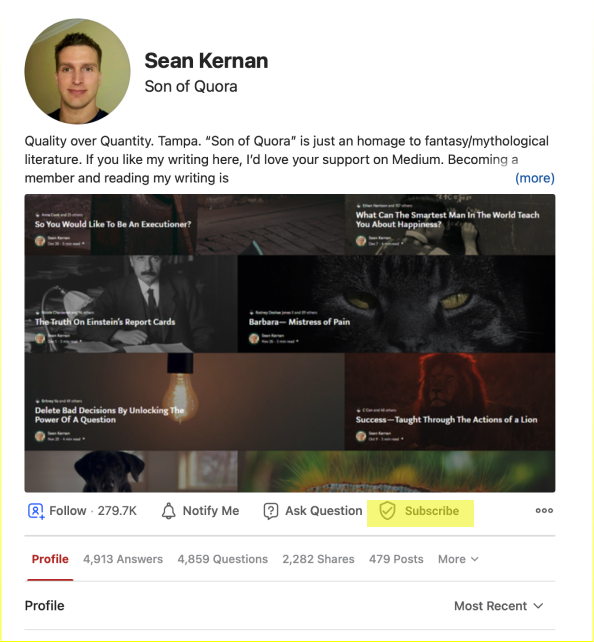While Substack has captured much of the recent fanfare around independent, written creators, I believe Quora has the potential to be another huge winner.
Why? New creators most care about discoverability and distribution. These are Quora’s key competencies! Quora should strengthen their writers’ ability to monetize their audience by providing a subscription offering.
Quora is a great place for new creators
New creators need a platform that provides an audience and enables discovery. Quora is best-in-class at both.
Quora's monthly audience is over 300M visitors, which is a huge base for a writer to draw from. Remember, an author only needs 1,000 true fans (or 100) to make a living. There's a potential scale to writing on Quora that doesn't exist elsewhere, which is a tremendous advantage for attracting new writers.
Moreover, Quora already uses an algorithmic feed to enable discovery. Much like TikTok, Quora surfaces the content it knows you want to see. Anyone’s answer can get discovered and go viral to a large audience. Then, over time more readers can discover your content given Quora’s primacy in SEO. That's a fantastic value proposition for new writers.
A platform like Substack is great for creators who are bringing an audience, but it doesn’t solve for discoverability. I don’t sense that Medium has the powerful algorithmic feed that Quora has built, nor does it get the same magnitude of traffic.
New creators need a chance to get discovered, and they need a platform that enables them to reach a huge audience. Quora provides both.
Quora's current challenge
Today, some Quorans try to direct their followers to other platforms. Why? Because they don’t have a way to directly monetize followers on Quora. That’s bad for Quora; they should want writers and followers to stay on their platform.
Moreover, it isn’t apparent to new creators that Quora is a natural place to gain a following. Since their ability to earn money is capped, why should they spend their time creating content on Quora? It may make more sense to start an independent blog. Sure, no one may ever read the content, but at least the writer owns the content and the relationship with what few readers they may get. Meanwhile, their earning potential is essentially uncapped if they hit it big and become the next Ben Thompson.
Quora can address these concerns through a subscription feature, a hedge to new creators. Quora will provide the opportunity for massive distribution and discoverability, while intermediating the writer’s relationship with their following. The writer just needs to provide strong content.
What should a subscription on Quora look like?
I think a subscription feature on Quora would look a lot like subscribing to a private blog. The writer would set a price for subscription and subscribed readers would receive defined benefits for their support. The dynamics of Quora provide a path for meaningful interactions between writers and subscribers.
Quora already has “spaces,” which function as interest groups, and making access to an writer’s space gated by a subscription seems straightforward to implement. If properly fostered by the writer, spaces can be a great way to build community, which can improve the retention of subscribers.
Subscribers can also have their answer requests flagged as “top priority” for the writer. While nothing obligates the writer to respond, Quora can help the writer manage the relationship with their community by highlighting members whose questions he has not answered.
Quora should also provide the writer with the ability to provide long-form written content to subscribers. While this isn’t the staple of Quora, which focuses on Q&A, it seems like this kind of content is what some top authors are already generating. Moreover, it’s a benefit that subscribers may be more likely to pay for if prioritized Q&A and access to exclusive spaces doesn’t appeal to them.


Identifying challenges/risks with a Quora subscription model
If I’m wrong about the value or impact of a subscription feature, it’s probably because of one of the following reasons:
1.) Gated content doesn't work well for Quora's business model. Quora's main growth loop depends on SEO. Users search the Internet and find Quora's free content. Some percentage of users who stumble onto the site create an account and write answers for free. These answers provide more content that Google indexes, and more users discover Quora. Gated content which requires a subscription to access doesn't add to this growth loop. Moreover, creating gated content reduces the amount of time an author spends creating free, accessible content.
I think the probability of this occurring is quite small because it seems unlikely that adding a subscription feature leads to a material impact in the generation of free, indexable content. But if enough “power writers” shift their time to generating content for subscribed users, Quora may see a decline in the generation of free content, which may negatively impact ad revenue.
2.) Demand or appetite for paid content by Quorans is overestimated. It could be that writers want paid subscribers, but the demand for paid content by followers is overestimated. Substack, for all of its acclaim and attention, was only clearing $1M in annual revenue as of March 2020. That seems pretty underwhelming.
The probability of overestimating subscriber interest is quite likely, since we don’t have an easy way to gauge the number of followers for an author who will convert to paying subscriber. So it may be that the revenue goals for this feature are most at risk. Nevertheless, just having the possibility of converting followers into paying subscribers may reduce author churn and improve growth rate of new writers. The magnitude of churn reduction and growth rate improvement may “make up” for missed revenue, since this content can be monetized through ads.
3.) Top authors get poached by competing platforms. Quora may find itself caught in the arms race for content creators alongside Patreon and Substack. These platforms are wholly built around intermediating creator/subscriber relationships. Substack especially is likely to attempt poaching of Quora's strongest, most revenue-generating authors.
This is a good problem to have! If/when it happens, it means that Quora has built a feature that allows writers to create a living. Some churn of authors is inevitable, but Quora seems better suited to offer authors more favorable financial terms since advertising is likely to remain its main revenue source. If we view the subscription feature as in support of the ad revenue growth loop described above, then the magnitude of the risk seems minor.
Quora is still best in-class in discoverability and distribution
Quora’s discoverability features and recommendation engine are likely to remain much stronger than its competitors. Why? Its the core feature of the experience for logged-in users. Paired with its volume in user traffic, Quora has the potential to be the place for written creators to build a following. A subscription feature would allow Quora to diversify its revenue, improve new writer growth, and enable more Ben Thompsons to start their careers.
